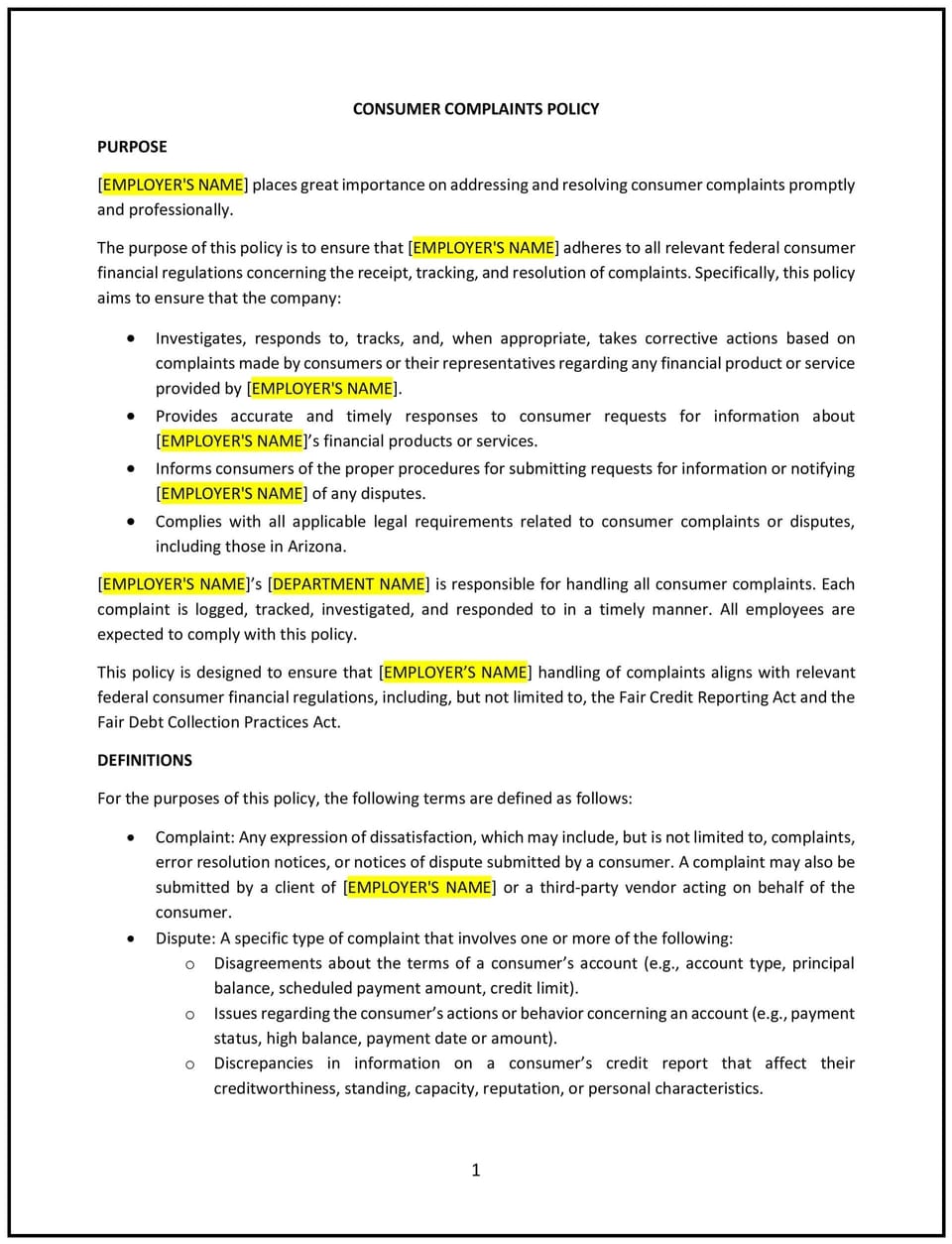Consumer complaints policy (Arizona): Free template

Consumer complaints policy (Arizona)
In Arizona, a consumer complaints policy provides businesses with a structured approach for handling customer grievances effectively and professionally. This policy helps maintain customer trust, ensures compliance with state and federal consumer protection laws, and protects the business’s reputation.
This policy outlines procedures for receiving, documenting, and resolving complaints while emphasizing the importance of timely communication and fair treatment. By implementing this policy, Arizona businesses can address consumer concerns proactively and reduce the risk of disputes.
How to use this consumer complaints policy (Arizona)
- Define the scope: Specify the types of complaints covered under this policy, such as product defects, service issues, or billing disputes.
- Establish reporting channels: Provide multiple options for customers to file complaints, such as email, phone, or online forms.
- Implement tracking systems: Use a consistent method for logging complaints to ensure they are addressed systematically and resolved promptly.
- Set response timeframes: Clearly state how quickly customers can expect their complaints to be acknowledged and resolved.
- Ensure follow-up: Include procedures for following up with customers to confirm satisfaction and gather feedback for process improvements.
Benefits of using a consumer complaints policy (Arizona)
This policy provides several benefits for Arizona businesses:
- Builds trust: Demonstrates a commitment to addressing customer concerns, fostering loyalty and satisfaction.
- Protects reputation: Mitigates negative publicity by resolving complaints before they escalate.
- Supports compliance: Ensures adherence to Arizona consumer protection laws, reducing the risk of legal disputes or penalties.
- Enhances processes: Provides valuable insights into areas for improvement, helping businesses refine their products or services.
- Promotes consistency: Establishes standardized procedures for handling complaints, ensuring fair and equal treatment of all customers.
Tips for using a consumer complaints policy (Arizona)
- Address Arizona-specific considerations: Adapt the policy to reflect local consumer protection laws or industry-specific requirements in Arizona.
- Train employees: Provide staff with the tools and knowledge to handle complaints professionally and empathetically.
- Use technology: Leverage customer relationship management (CRM) systems to track and manage complaints efficiently.
- Monitor trends: Analyze complaint data to identify recurring issues and implement preventive measures.
- Review regularly: Update the policy to ensure alignment with changing regulations or business practices.
Q: How does this policy help improve customer satisfaction?
A: By providing a clear and efficient process for addressing complaints, the policy ensures customers feel heard and valued, improving their overall experience with the business.
Q: What steps should a business take after receiving a complaint?
A: The business should log the complaint, acknowledge it promptly, investigate the issue, provide a resolution, and follow up to ensure customer satisfaction.
Q: How can businesses track complaints effectively?
A: Use a centralized system, such as a CRM or complaint management software, to log, monitor, and analyze all customer complaints consistently.
Q: Are there specific Arizona laws this policy supports?
A: Yes, this policy aligns with Arizona’s consumer protection laws by ensuring fair treatment and prompt resolution of customer grievances.
Q: How can this policy reduce legal risks?
A: By documenting all complaints and resolutions, the policy provides a clear record that can be used to demonstrate compliance with consumer protection regulations if disputes arise.
This article contains general legal information and does not contain legal advice. Cobrief is not a law firm or a substitute for an attorney or law firm. The law is complex and changes often. For legal advice, please ask a lawyer.


